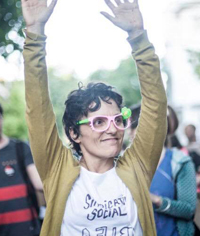(Creation Residence )
L'animal a l'esquena (Celrà)
From 02/07/2021 to 10/07/2021
Federica Folco, Idoia Zabaleta
 Holding this residency at L'animal a l’esquena offers the opportunity to revisit a space I am fond of, full of care and motivation which invites one to go deeper into the complexities of our practice. The project emerged from the dialogue between our desires and the special circumstances our communities are living through at the moment. Within the framework of the project I have been working on for several years, Insurrección del sensible (Insurrection of the Sensitive), I propose, in collaboration with Idoia Zabaleta, to investigate and create experiences that promote plural, porous, dynamic, diverse and shared bodies.
Holding this residency at L'animal a l’esquena offers the opportunity to revisit a space I am fond of, full of care and motivation which invites one to go deeper into the complexities of our practice. The project emerged from the dialogue between our desires and the special circumstances our communities are living through at the moment. Within the framework of the project I have been working on for several years, Insurrección del sensible (Insurrection of the Sensitive), I propose, in collaboration with Idoia Zabaleta, to investigate and create experiences that promote plural, porous, dynamic, diverse and shared bodies.
For this research we must inevitably ask ourselves about our relationships with our surroundings, especially with other people. An underlying characteristic of movement practices is an ethical political approach to the body and desire. It us up to us to decide whether these are used to tame or to free, and whether or not they question the dominant order. Political art implies introducing other meanings to reality. We intend to question and transform the beasts of individualist bodies, promoting practices and experiences that create relationships of solidarity.
L'animal a l'esquena (Celrà)
From 02/07/2021 to 10/07/2021
Federica Folco, Idoia Zabaleta
 Holding this residency at L'animal a l’esquena offers the opportunity to revisit a space I am fond of, full of care and motivation which invites one to go deeper into the complexities of our practice. The project emerged from the dialogue between our desires and the special circumstances our communities are living through at the moment. Within the framework of the project I have been working on for several years, Insurrección del sensible (Insurrection of the Sensitive), I propose, in collaboration with Idoia Zabaleta, to investigate and create experiences that promote plural, porous, dynamic, diverse and shared bodies.
Holding this residency at L'animal a l’esquena offers the opportunity to revisit a space I am fond of, full of care and motivation which invites one to go deeper into the complexities of our practice. The project emerged from the dialogue between our desires and the special circumstances our communities are living through at the moment. Within the framework of the project I have been working on for several years, Insurrección del sensible (Insurrection of the Sensitive), I propose, in collaboration with Idoia Zabaleta, to investigate and create experiences that promote plural, porous, dynamic, diverse and shared bodies. For this research we must inevitably ask ourselves about our relationships with our surroundings, especially with other people. An underlying characteristic of movement practices is an ethical political approach to the body and desire. It us up to us to decide whether these are used to tame or to free, and whether or not they question the dominant order. Political art implies introducing other meanings to reality. We intend to question and transform the beasts of individualist bodies, promoting practices and experiences that create relationships of solidarity.